ABUJA, Nigeria — Former Vice-President Atiku Abubakar has claimed that the administration he served under, led by then-President Olusegun Obasanjo, decisively ended Boko Haram’s initial activities “within a few weeks” in 2002, attributing the success to political will and swift military action.
Atiku made the remarks on Wednesday, May 14, 2025, in Abuja during a meeting with stakeholders from Kogi East Senatorial District, led by Simon Achuba, a former deputy governor of Kogi State.
In a video of the meeting shared on his official X account, the former vice-president recounted how the group emerged during their time in office and how the leadership at the time responded promptly.
“You remember when Boko Haram started? It was actually in 2002. We were in office, and the president sent for me. It started in Yobe, actually,” Atiku said.
“And I said, ‘Mr President, let’s call the service chiefs and give them a deadline. If they cannot put it down, then they should put down their uniforms and go away.’
“He called the service chiefs—I was there—and gave them marching orders. Within a few weeks, they put down the insurgency in Yobe. It never came up again till we left office.”
Atiku criticised subsequent administrations for failing to maintain the momentum, accusing them of lacking the resolve to confront the group decisively.
“One thing I would say is that there is a lack of political will. When they are killing your citizens, how you can even eat and not give a damn is the greatest irresponsibility by any political leader anywhere,” he said.
He also lamented the nation’s security architecture, noting that Nigeria remains under-policed and unable to meet the internal security demands of its growing population.
“We have so many educated and unemployed individuals—why can’t they be recruited into the police?” he asked.
The former vice-president charged community leaders and political stakeholders to unite in confronting what he called an inefficient government.
Boko Haram, founded by Mohammed Yusuf in 2002 in Maiduguri, Borno State, initially focused on religious teachings and anti-Western education.
However, the group turned violent in 2009 during a deadly uprising in the northeast that left nearly 1,000 people dead.
Yusuf’s extrajudicial killing by security forces triggered a new wave of insurgency under the leadership of Abubakar Shekau.
Since then, Boko Haram has killed tens of thousands and displaced millions, particularly in Nigeria’s northeast, while also expanding attacks to neighbouring countries such as Niger, Chad, and Cameroon.







![Honouring a Rare Soul: Celebrating the Life of AVM Terry Omatsola Okorodudu [MUST READ] Air Vice Marshal Terry Omatsola Okorodudu](https://www.thetrentonline.com/wp-content/uploads/2026/01/Joan-and-Bidemi-Okorodudu-The-Trent-100x70.jpg)